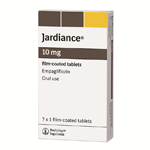 Late last month, Eli Lilly ($LLY) and Boehringer Ingelheim said their SGLT2 med, Jardiance, became the first diabetes med to show it could actually lower the risk of heart attack, stroke and death from cardiovascular causes. But even with that potentially hefty benefit, payers aren't getting ahead of themselves.
Late last month, Eli Lilly ($LLY) and Boehringer Ingelheim said their SGLT2 med, Jardiance, became the first diabetes med to show it could actually lower the risk of heart attack, stroke and death from cardiovascular causes. But even with that potentially hefty benefit, payers aren't getting ahead of themselves.
Instead, they're waiting to see just how much the med cuts CV risk and whether bodies like the American Diabetes Association (ADA) update guidelines before making any changes to their formularies, Leerink analyst Seamus Fernandez wrote in a note to investors on Tuesday.
Among 23 payers that responded to a survey he conducted, about 45% said their decisions would rest on the magnitude of the CV risk reduction. And 83% of respondents suggested they'd take any guideline changes into account. "In our view, this could make guideline updates, particularly ADA guidelines, a major driver of Jardiance and SGLT2 sales," he wrote.
Those kinds of revisions could follow the full presentation of the results from the companies' EMPA-REG trial, which will take place at the European Association for the Study of Diabetes conference in Stockholm. Fernandez, for one, expects that Lilly's Jardiance sales could score a boost between $700 million and $2.1 billion from those data alone.
Even if the data do turn out stellar, though, that doesn't mean all payers will necessarily be making payment revisions. Forty percent of survey participants said the results would have no impact on Jardiance reimbursement or reimbursement of the broader SGLT2 class, Fernandez pointed out.
 |
| Merck's Peter Stein |
And it also doesn't mean that makers of diabetes drugs in other classes--think Merck ($MRK), which makes DPP-4 powerhouse Januvia--need to worry, Peter Stein, the New Jersey pharma giant's VP of clinical research in diabetes and endocrinology, told FiercePharma in an interview at the European Society of Cardiology Congress.
Combinations "really are a part of how we treat diabetes, and not a small part--they're a major part," he said.
And he's not the only one who sees it that way. In another recent survey, this one from FirstWord Pharma, 73% of 172 participating endocrinologists said the new Jardiance data would have either "no negative impact" or only a "slightly negative impact on Januvia and its fellow DPP-4s.
"Do I think this is going to dramatically change the use of Januvia? No," Stein said. "Physicians have come to really trust it as an agent to manage their diabetes, and I think they'll continue to do so."
Special Report: Top 10 best-selling diabetes drugs of 2013